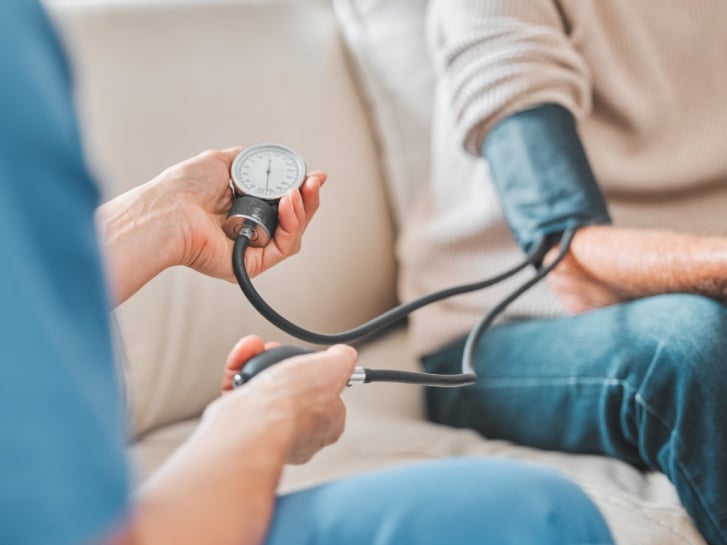
Flu and your heart condition
Flu (seasonal influenza) is a common virus that can make you weaker and more unwell than a cold. If you’ve got a heart or circulatory condition, you’re more at risk of getting seriously ill with the flu.
What are the symptoms of the flu?
The virus that causes flu is contagious, so it’s easy to spread and catch. Typical flu symptoms include:
- a fever (a temperature of 38°C or 100.4°F) or above
- a runny or blocked nose and sneezing
- a sore throat
- a cough
- muscle aches and pain
- headaches
- feeling very tired or weak (fatigue)
- loss of appetite.
Sometimes, it’s possible to get other illnesses like bronchitis or a lung infection if you catch the flu.
If you’re healthy, the symptoms of flu will usually begin to improve after 5 to 8 days. It will clear up on its own, but it can be a few weeks before you completely recover.
Who's more at risk of catching the flu?
Anyone can catch the flu. It's possible to get it all year round but it’s more common in the winter months. Some people are more at risk of having worse symptoms and complications. This includes:
- anyone over the age of 65
- pregnant women
- children and adults with a medical condition (for example, heart or lung disease)
- children and adults with weakened immune systems.
The flu causes stress to your body which can affect your blood pressure, heart rate and heart function. There’s evidence that heart attacks happen more often during or immediately after an illness like flu. This is more likely for older people with a heart condition.
If you have a chronic heart condition, including heart failure or congenital heart disease, we recommend that you get the flu jab. You should contact your healthcare professional as soon as you feel unwell or if you think you may have caught the flu.
How can I look after myself with the flu?
Once you’ve spoken to a healthcare professional and they’ve given you information, try to rest as much as possible. Try our top tips to help with flu symptoms:- Dehydration is a risk when you have the flu so drink lots of water, herbal teas, broths and soups. If you have fluid restrictions because of a condition like heart failure, check with your healthcare professional before drinking more water.
- If you can, eat foods high in zinc like eggs, lentils, chickpeas, beans and nuts. Studies show that zinc fights cold and flu symptoms.
- Keep warm by wrapping up in layers and sleep as much as you can.
- Have a teaspoon of honey 3 times a day. Honey contains antiviral properties that could help to fight symptoms. If you have a condition like diabetes, do not use honey to help with the flu as it will add sugar into your diet.
- Take a hot shower or use a humidifier to inhale steam. This can help to clear your airways and make it easier to breathe.
- Eat simple, non-greasy foods like wholewheat toast, soups, and fruit to give your body some energy to fight the flu.
Flu is caused by a virus and not by bacteria, so antibiotics will not help. In some cases, your doctor may prescribe antiviral medicines to improve symptoms and help you to recover quicker.
How long does the flu last?
How long the flu lasts is different for everyone, it depends on your general health, if you have other health conditions, and how soon you get treatment. Most people recover within a week of getting the flu.
You should get help for the flu from NHS 111 or 999 if you have the following symptoms:
- fast breathing or trouble breathing
- blue lips or face
- chest pain or pressure
- fever or cough that improves but then comes back or gets worse
- confusion or not responsive.
If your child has a heart condition, speak to a healthcare professional as soon as you know they’re unwell.
Can I take cold and flu medicines with a heart condition?
If you take warfarin, it's important to know that if you have cold or flu-like symptoms, it can affect how your blood clots. If you feel unwell, speak to a healthcare professional or pharmacist about this.
Some over-the-counter flu medicines cannot be used when taking medicines for heart conditions, so talk to a healthcare professional or pharmacist before taking things like painkillers and cough medicines.
What is the flu vaccine?
Getting a flu vaccination or the ‘flu jab’ helps to protect you from getting the flu. No vaccine can protect you completely, but we encourage you to get vaccinated if you're in one of the following groups:
- people living with heart or circulatory disease
- people living with diabetes, chronic liver or chronic kidney disease
- pregnant women
- people living with respiratory diseases, such as chronic asthma
- people living with neurological disease, such as Parkinson’s disease
- people over the age of 65
- people who have spleen issues or have had their spleen removed
- people with a weakened immune system.
You may get a letter inviting you to a clinic to get your vaccine. Your GP or practice nurse can give you more information about it. It's a good idea to avoid close contact with friends or relatives who have the virus.
If you’re aged 65 and over or have a long-term health condition, like a heart condition, then you’re eligible for the pneumococcal vaccine. This will help to protect you from diseases such as pneumonia. The pneumococcal vaccine is available for free and you only need to have it once.
How does the flu vaccine work?
For most people, the flu vaccine is considered safe and would not be used if it was not. Talk to a healthcare professional if you’re concerned about any risks, allergies or potential side effects that may affect you.
The flu vaccine contains strains of the flu virus that are not active, so it cannot cause you to catch the flu. These strains of the flu virus are often grown on fertilised hens’ eggs, so you're more at risk of a reaction to the flu vaccine if you have an egg allergy.
Egg-free flu jabs are now available, although your GP may arrange for you to have your vaccine in a hospital if your egg allergy is very severe.
The effects of the flu jab only last for a year so you should have a top up every winter.
Read more about why the flu jab is important.
Getting the flu vaccine for free
You can get the flu vaccine for free if you have certain long-term health conditions, including heart disease and heart failure. You can also get it for other long-term health conditions.
Find out more about getting the flu vaccine for free through the NHS.
Heart Helpline and other support
- Speak to our cardiac nurses by phone, callback, email or online chat on Heart Helpline (Monday to Friday, 9am to 5pm).
- Sign up to our Heart Matters magazine for online information packed with health and lifestyle advice.
- Join our HealthUnlocked community to share experiences, ask questions and support one another if you're affected by heart and circulatory conditions.

You can trust our health information
We've followed an eight-step process to make sure this content is reliable, accurate and trustworthy.
Learn how we make our health content.More information


Treatments




